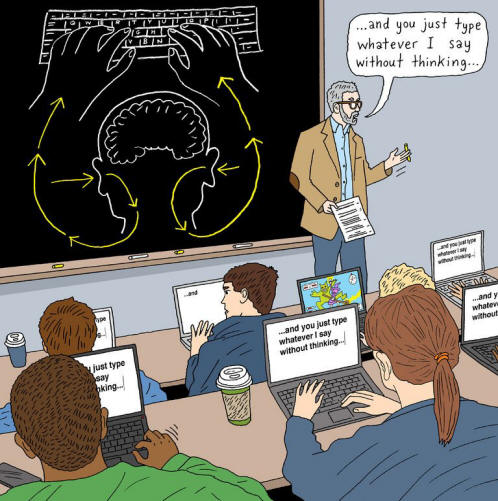|
Note: for any who
are using this as a guide, this is the template I use, so
please ignore all specifics that do not apply!
SYLLABUS
For week by week description of requirements,
assignments, and exams, refer to the Course Outline at the
following link:
Place link to Course Outline here
Course Description
Copy from University Catalog
Prerequisites: MUSI xxxx
Required Materials
Textbook
Access to Finale (notation program).
To purchase Finale for $99, contact the bookstore in the student
center to order. The manager of the bookstore is Carrie
McCann (cmccann@tarleton.edu).
Finale is available on computers in the Fine Arts
building, but those labs are also used for classes, so
access is limited.
Music staff paper. Go
here
to print staff paper with keyboard and
here for various other configurations
Notebook: it will not be graded, but returned assignments
and notes taken in class will
be your exam study materials. If you get a spiral notebook,
make sure it has pockets.
3X5 cards
Pencil and eraser. I will not accept any assignment written in ink. Mechanical pencils are a good choice.
Why use pencil?
Course Work
In-class lectures, discussions and analyses
Assignments, including student compositions
Individual work on computer programs
Note: Please see the Course Outline for
specific topics, schedule, requirements, and deadlines.
Assignments
All homework assignments are due at
the beginning of class on the due date specified in the Course Outline. Specific instructions for assignments will often be listed in the Course Outline which will be updated on the course web page. It is important to refer to this page often.
Modifications to the schedule will be announced in class
or posted in the Course Outline.
Late assignments will only be accepted with prior approval and then at a penalty of ten points per calendar day.
In case of building closure, students will be notified
by Tarleton email through Canvas of alternate online
assignments.
Grading Will Be Based On
Assignments and compositions xx%
Midterm exam xx%
Final exam xx%
Class participation xx%
Grade calculator
Note: Music exists in time. It is important for music professionals to be able to perceive and identify musical elements quickly or they will be of little use. For this reason, proficiency in the areas of music theory includes speed as well as understanding and assessment will include both.
Some assignments are based upon
answers that are right or wrong and will be graded
objectively. Other assignments will have subjective
content. In grading those assignments, students do not
begin with a 100 percent and lose points for
infractions. Rather, these grades are judgments about
overall performance. That is to say, students who have
earned an 85% did not necessarily "lose" 15 points
through error, but were judged to have performed at a B
level. These levels are basically described as:
A: Excellent
B: Good
C: Average
D: Below average
F: Unsatisfactory
A grade of C or above is
required to pass the course.
Tarleton differentiates between a
failed grade in a class because a student never attended (F0 grade),
stopped attending at some point in the semester (FX grade), or because
the student did not pass the course (F) but attended the entire
semester. These grades will be noted on the official transcript.
Stopping or never attending class can result in the student having to
return financial aid monies received. For more information see the Tarleton
Financial Aid website.

Attendance Policy
Attendance is required. Absences will only be excused with proper
written documentation. This includes a note from a healthcare provider in case of illness or a form signed by a sponsor (presented in advance) in the case of a University sanctioned activity. Attendance at funerals and court appearances will also be excused with proper documentation and advance notice.
Class will begin on time according to the clock on
the Course Outline. If you are late and have
already been marked absent, it is your responsibility
to check in at the end of class to have the absence
corrected to a tardy. Use this
link to set your watch.
A student's absences will not change any deadline or assignment requirements. You are always responsible for any material you miss, so check the Course Outline and/or a fellow classmate for announcements, assignments, and requirements.
Classroom Policy
No food in the classroom.
Drinks in hard-sided containers with lids are allowed.
Turn off your cell phones and put them out of sight - mine
and yours. Text messaging is prohibited in the classroom. Please see me if you have a special emergency situation requiring this type of communication.
Attention will be given to the lesson at hand, or you will be excused from the classroom. (In other words, no working on other homework, personal business, sleeping, etc.)
Keep your backpacks and other personal belongings out of the aisles for the sake of convenience and safety.
Do not leave the room during class except for an emergency as this disruption is almost always (except for an emergency) avoidable.
Although it may not be disruptive to slip out, coming
back in is always distracting.
If your conduct for any reason is unacceptable, you will be asked to leave. Do not return to class until you have made an appointment to see me and the situation has been resolved.
Leave your space better than you found it.
No laptops or tablets for taking notes without special
permission.

Office Hours
This course moves quickly. If you begin to experience problems, consult me right away. Do not wait until you are hopelessly behind or lost.
My office hours are posted on my door, but if the door
is open, please feel free to knock and come in any time. Extra help (including tutoring) is
also available. If you are participating remotely or in
an online class, please see the Course Outline for
weekly Zoom office hours and a link to participate at
that time.
Academic Conduct
Tarleton State University expects its students to
maintain high standards of personal and scholarly
conduct. Students guilty of academic dishonesty are
subject to disciplinary action. Academic dishonesty
includes, but is not limited to, cheating on an
examination or other academic work, plagiarism
(submitting another person's materials or ideas as
one's own, or doing work for another person who will
receive academic credit), collusion, and the abuse
of resource materials. This includes the use of unauthorized books, notebooks, or other sources in order to secure or give help during an examination; the unauthorized copying of examinations, assignments, reports, or term papers; or the presentation of unacknowledged material as if it were the student's own work.
Any student caught cheating or plagiarizing will receive a grade of "F" for the class. Further disciplinary action may also be taken beyond the Department of Fine Arts. Consult the following link for further information on academic conduct as specified in the TSU catalog.
Academic Conduct - Judicial Affairs - Tarleton State
University
Student
Success Statement - ADA
It is the policy of Tarleton State University to
comply with the Americans with Disabilities Act (www.ada.gov) and other applicable laws.
If you are a student with a disability seeking accommodations for this
course, please contact the Center for Access and Academic Testing at
254.968.9400 or caat@tarleton.edu.
Student Disability Services is located in Math 201. More information can be found at www.tarleton.edu/caat
or in the University Catalog.
Health and Wellness Policy
It is the Department of Fine Arts' policy to provide
and maintain a safe and healthy work environment for
students, faculty, and staff, and to accept
responsibility for the health and safety of others,
including visitors, who may be affected by our
activities. This policy applies to all activities
and areas of the department, including performance
spaces, classrooms, studios, practice rooms, faculty
and staff offices, and communal areas.
Academic Affairs
Core Value Statements
Academic Integrity Statement
Tarleton State University's core values are
integrity, leadership, tradition, civility, excellence,
and service. Central to these values is integrity,
which is maintaining a high standard of personal and
scholarly conduct. Academic integrity represents
the choice to uphold ethical responsibility for one's
learning within the academic community, regardless of
audience or situation.
Academic Civility Statement
Students are expected to interact with professors and
peers in a respectful manner that enhances the learning
environment. Professors may require a student who
deviates from this expectation to leave the face-to-face
(or virtual) classroom learning environment for that
particular class session (and potentially subsequent
class sessions) for a specific amount of time. In
addition, the professor might consider the university
disciplinary process (for Academic Affairs/Student Life)
for egregious or continued disruptive behavior.
Academic Excellence Statement
Tarleton holds high expectations for students to
assume responsibility for their own individual learning.
Students are also expected to achieve academic
excellence by:
- honoring Tarleton's core values
- upholding high standards of habit and behavior
- maintaining excellence through class attendance and
punctuality
- preparing for active participation in all learning
experiences
- putting forth their best individual effort
- continually improving as independent learners
- engaging in extracurricular opportunities that
encourage personal and academic growth
- reflecting critically upon feedback and applying
these lessons to meet future challenges
Academic Affairs Service
Statement
Tarleton faculty, staff, and students are expected to
model responsible citizenship through service activities
that promote personal and academic growth while
enhancing the university, local, regional, national, and
global communities. These activities will foster a
culture of academic/public engagement that contributes
to the achievement of the university's mission and core
values.
University Policy
Students are responsible for knowing and abiding by
the policies and information contained in the Tarleton
Student Handbook. [See Student Handbook]
Safety
Measures
Tarleton
State University has adopted policies to limit transmission of the novel coronavirus. Students are required to observe the following
practices while participating in face-to-face courses and
course-related activities (office hours, moving between
classes, study spaces, academic services, etc.):
-
Self-monitoring Students should follow CDC
recommendations for self-monitoring. Students who
exhibit symptoms of COVID-19 (with or without fever)
should participate in class remotely and should not
participate in face-to-face instruction. See https://www.tarleton.edu/roadmap/personal-responsibilities/ for
more information. Students who test positive for
COVID-19 or experience symptoms consistent with COVID-19
are required to self-report to Tarleton State University
via this form.
-
Face
coverings All students must properly wear face
coverings in all public spaces on campus, including
classrooms. If a student refuses to wear a face
covering, the instructor will ask the student to leave
and join the class remotely. Any student refusing to
comply will be reported to the Dean of Students
Administrative Office via the Student
Affairs Incident Reporting Form.
Additionally, the faculty member may choose to teach
that days class remotely for all students.
-
Physical
Distancing Physical distancing must be maintained
between students, instructors, and others in course and
course-related activities.
-
Classroom Entrance and Exit Students should leave
classrooms promptly after class activities have
concluded each day. Students should not congregate in
hallways or other areas and should maintain a safe
physical distance when waiting to enter classrooms and
other instructional areas.
Note: Please see the Course Outline for specific topics, schedule,
requirements, and deadlines.

Created and maintained by Vicky V. Johnson
|